Higher National Diploma in Business: Entrepreneurial Ventures Report
VerifiedAdded on 2023/01/12
|18
|6315
|99
Report
AI Summary
This report, focusing on Entrepreneurship and Small Business Management, explores various aspects of entrepreneurial ventures. It begins with an introduction to entrepreneurship and its role in setting up businesses, followed by an analysis of different venture types including small businesses, large enterprises, scalable start-ups, and social enterprises. The report then delves into entrepreneurial typology, examining female, male, serial, and social typologies. It compares and contrasts these ventures, highlighting similarities and differences. Furthermore, the report interprets relevant data and statistics to illustrate the impact of micro and small businesses on the UK economy, emphasizing their role in job creation and economic growth. It also discusses the significance of small business start-ups in the social economy and identifies characteristic traits and skills of successful entrepreneurs, differentiating them from business managers. Finally, it assesses entrepreneurial personality and how background and experience can influence entrepreneurial endeavors.
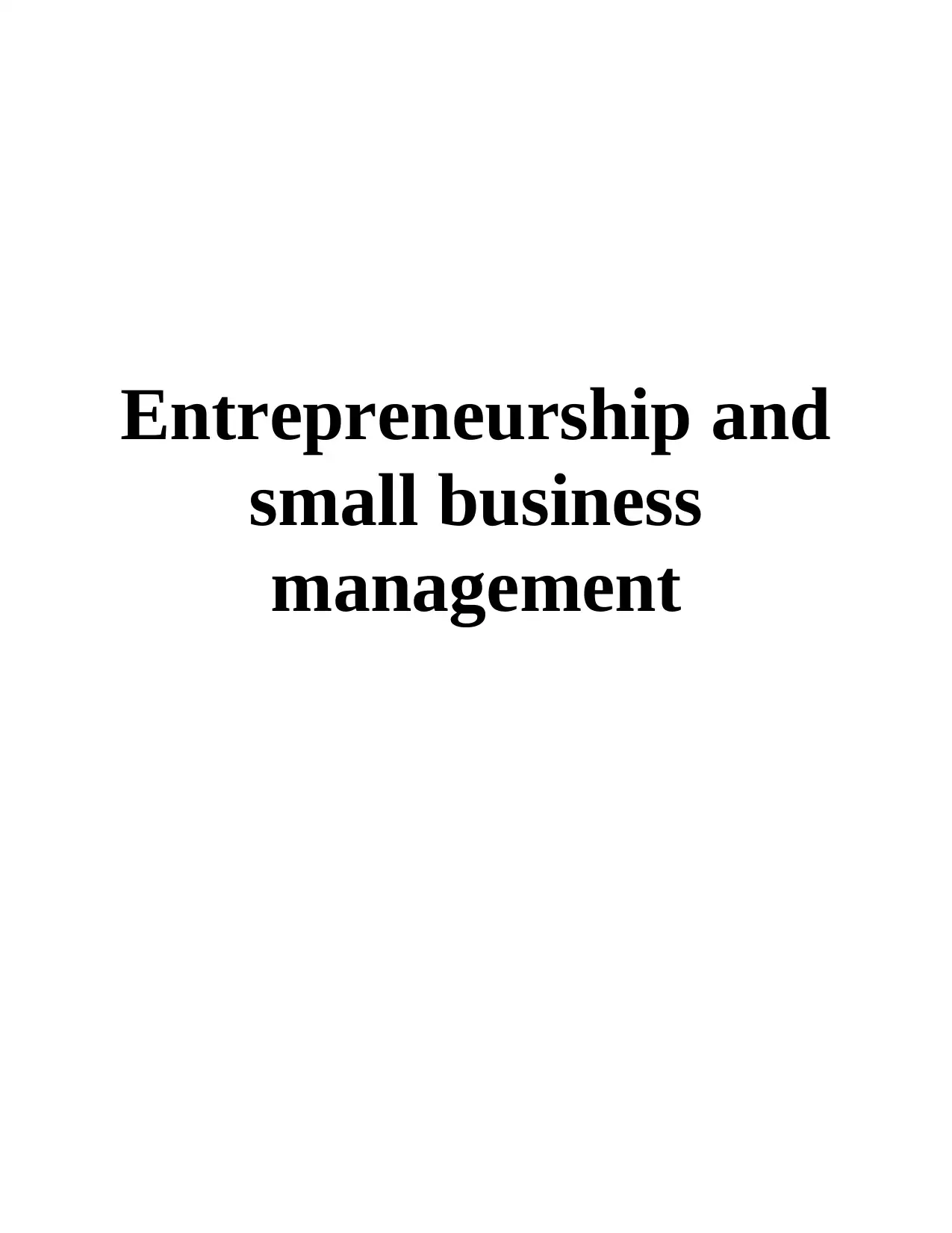
Entrepreneurship and
small business
management
small business
management
Paraphrase This Document
Need a fresh take? Get an instant paraphrase of this document with our AI Paraphraser
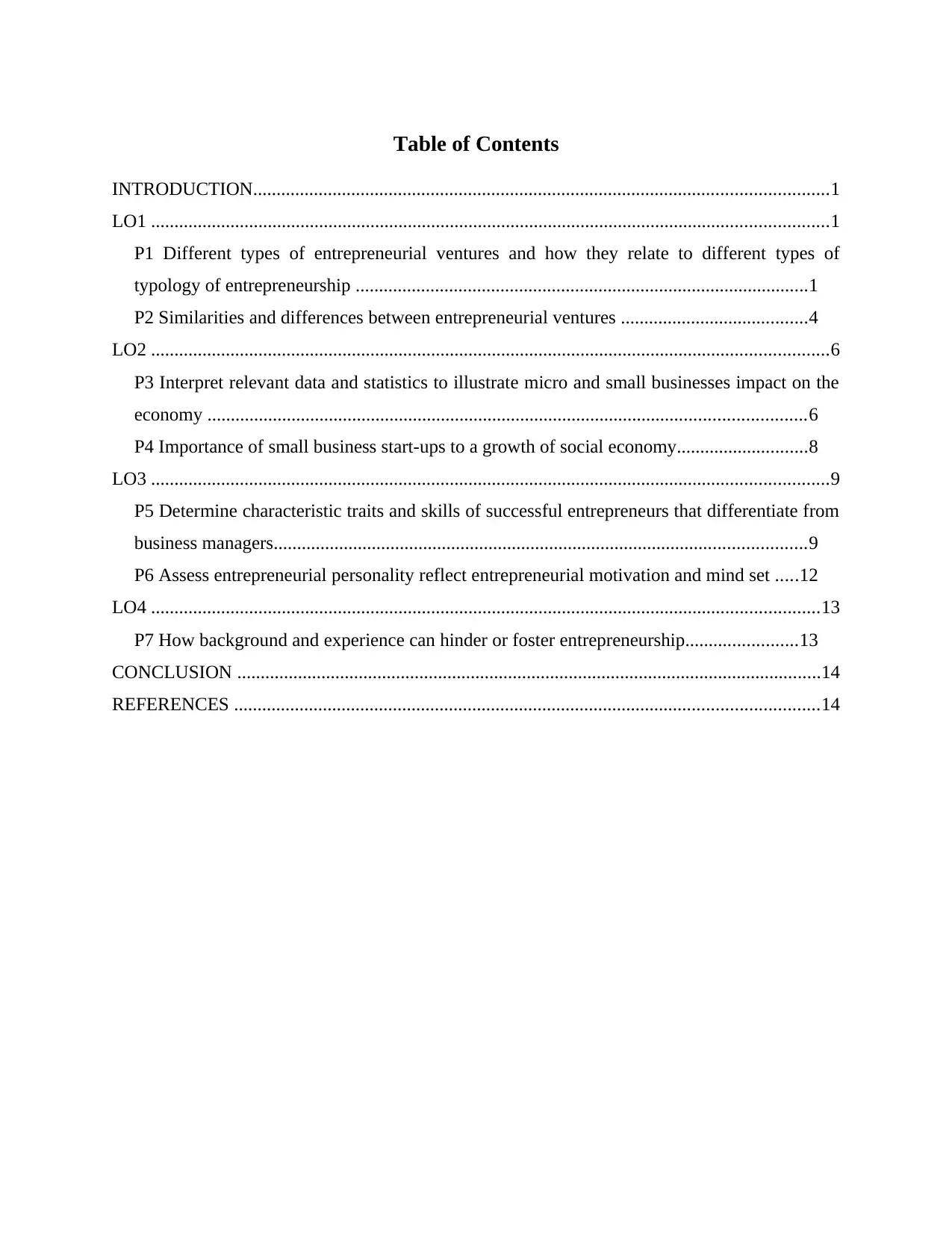
Table of Contents
INTRODUCTION...........................................................................................................................1
LO1 .................................................................................................................................................1
P1 Different types of entrepreneurial ventures and how they relate to different types of
typology of entrepreneurship .................................................................................................1
P2 Similarities and differences between entrepreneurial ventures ........................................4
LO2 .................................................................................................................................................6
P3 Interpret relevant data and statistics to illustrate micro and small businesses impact on the
economy ................................................................................................................................6
P4 Importance of small business start-ups to a growth of social economy............................8
LO3 .................................................................................................................................................9
P5 Determine characteristic traits and skills of successful entrepreneurs that differentiate from
business managers..................................................................................................................9
P6 Assess entrepreneurial personality reflect entrepreneurial motivation and mind set .....12
LO4 ...............................................................................................................................................13
P7 How background and experience can hinder or foster entrepreneurship........................13
CONCLUSION .............................................................................................................................14
REFERENCES .............................................................................................................................14
INTRODUCTION...........................................................................................................................1
LO1 .................................................................................................................................................1
P1 Different types of entrepreneurial ventures and how they relate to different types of
typology of entrepreneurship .................................................................................................1
P2 Similarities and differences between entrepreneurial ventures ........................................4
LO2 .................................................................................................................................................6
P3 Interpret relevant data and statistics to illustrate micro and small businesses impact on the
economy ................................................................................................................................6
P4 Importance of small business start-ups to a growth of social economy............................8
LO3 .................................................................................................................................................9
P5 Determine characteristic traits and skills of successful entrepreneurs that differentiate from
business managers..................................................................................................................9
P6 Assess entrepreneurial personality reflect entrepreneurial motivation and mind set .....12
LO4 ...............................................................................................................................................13
P7 How background and experience can hinder or foster entrepreneurship........................13
CONCLUSION .............................................................................................................................14
REFERENCES .............................................................................................................................14
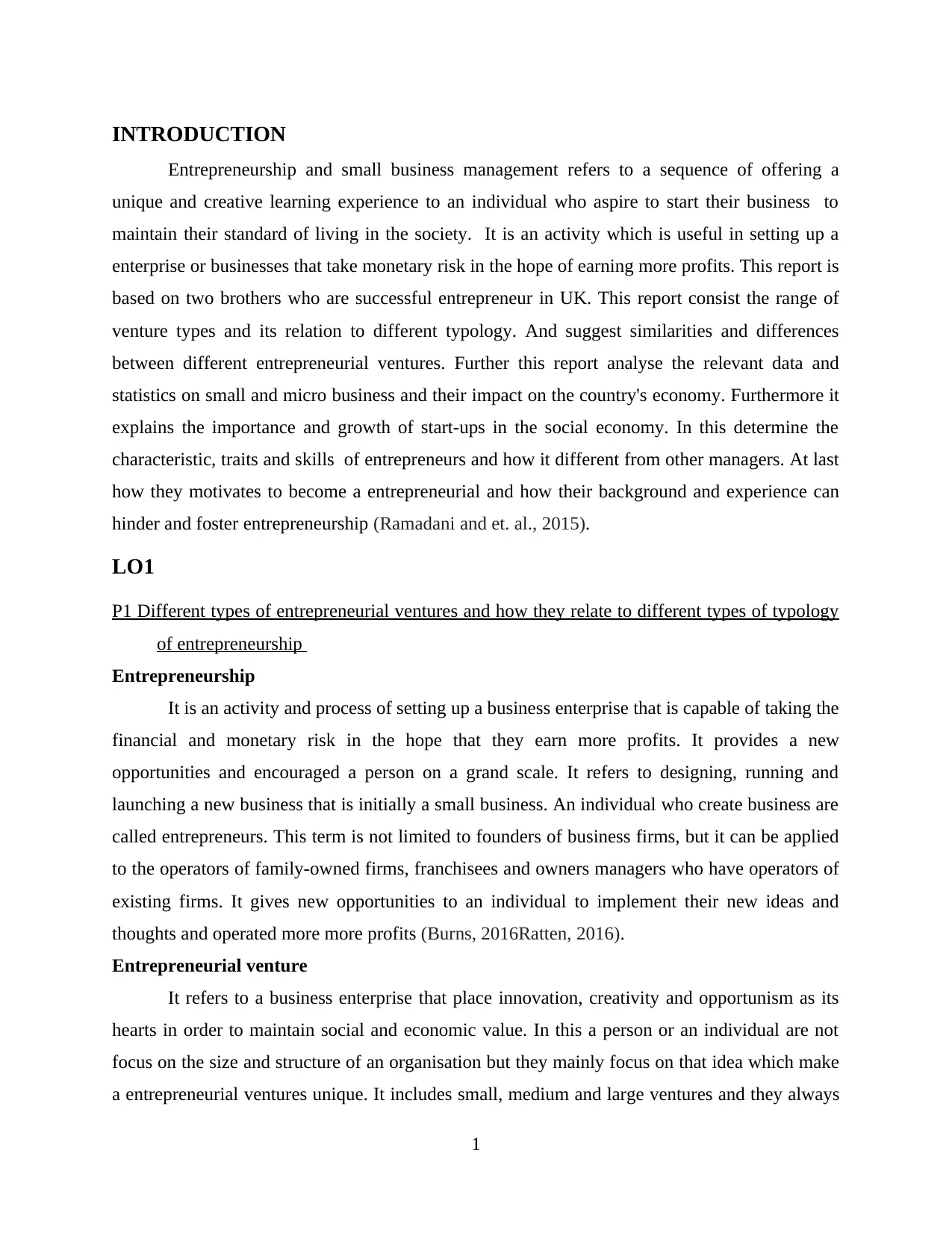
INTRODUCTION
Entrepreneurship and small business management refers to a sequence of offering a
unique and creative learning experience to an individual who aspire to start their business to
maintain their standard of living in the society. It is an activity which is useful in setting up a
enterprise or businesses that take monetary risk in the hope of earning more profits. This report is
based on two brothers who are successful entrepreneur in UK. This report consist the range of
venture types and its relation to different typology. And suggest similarities and differences
between different entrepreneurial ventures. Further this report analyse the relevant data and
statistics on small and micro business and their impact on the country's economy. Furthermore it
explains the importance and growth of start-ups in the social economy. In this determine the
characteristic, traits and skills of entrepreneurs and how it different from other managers. At last
how they motivates to become a entrepreneurial and how their background and experience can
hinder and foster entrepreneurship (Ramadani and et. al., 2015).
LO1
P1 Different types of entrepreneurial ventures and how they relate to different types of typology
of entrepreneurship
Entrepreneurship
It is an activity and process of setting up a business enterprise that is capable of taking the
financial and monetary risk in the hope that they earn more profits. It provides a new
opportunities and encouraged a person on a grand scale. It refers to designing, running and
launching a new business that is initially a small business. An individual who create business are
called entrepreneurs. This term is not limited to founders of business firms, but it can be applied
to the operators of family-owned firms, franchisees and owners managers who have operators of
existing firms. It gives new opportunities to an individual to implement their new ideas and
thoughts and operated more more profits (Burns, 2016Ratten, 2016).
Entrepreneurial venture
It refers to a business enterprise that place innovation, creativity and opportunism as its
hearts in order to maintain social and economic value. In this a person or an individual are not
focus on the size and structure of an organisation but they mainly focus on that idea which make
a entrepreneurial ventures unique. It includes small, medium and large ventures and they always
1
Entrepreneurship and small business management refers to a sequence of offering a
unique and creative learning experience to an individual who aspire to start their business to
maintain their standard of living in the society. It is an activity which is useful in setting up a
enterprise or businesses that take monetary risk in the hope of earning more profits. This report is
based on two brothers who are successful entrepreneur in UK. This report consist the range of
venture types and its relation to different typology. And suggest similarities and differences
between different entrepreneurial ventures. Further this report analyse the relevant data and
statistics on small and micro business and their impact on the country's economy. Furthermore it
explains the importance and growth of start-ups in the social economy. In this determine the
characteristic, traits and skills of entrepreneurs and how it different from other managers. At last
how they motivates to become a entrepreneurial and how their background and experience can
hinder and foster entrepreneurship (Ramadani and et. al., 2015).
LO1
P1 Different types of entrepreneurial ventures and how they relate to different types of typology
of entrepreneurship
Entrepreneurship
It is an activity and process of setting up a business enterprise that is capable of taking the
financial and monetary risk in the hope that they earn more profits. It provides a new
opportunities and encouraged a person on a grand scale. It refers to designing, running and
launching a new business that is initially a small business. An individual who create business are
called entrepreneurs. This term is not limited to founders of business firms, but it can be applied
to the operators of family-owned firms, franchisees and owners managers who have operators of
existing firms. It gives new opportunities to an individual to implement their new ideas and
thoughts and operated more more profits (Burns, 2016Ratten, 2016).
Entrepreneurial venture
It refers to a business enterprise that place innovation, creativity and opportunism as its
hearts in order to maintain social and economic value. In this a person or an individual are not
focus on the size and structure of an organisation but they mainly focus on that idea which make
a entrepreneurial ventures unique. It includes small, medium and large ventures and they always
1
⊘ This is a preview!⊘
Do you want full access?
Subscribe today to unlock all pages.

Trusted by 1+ million students worldwide
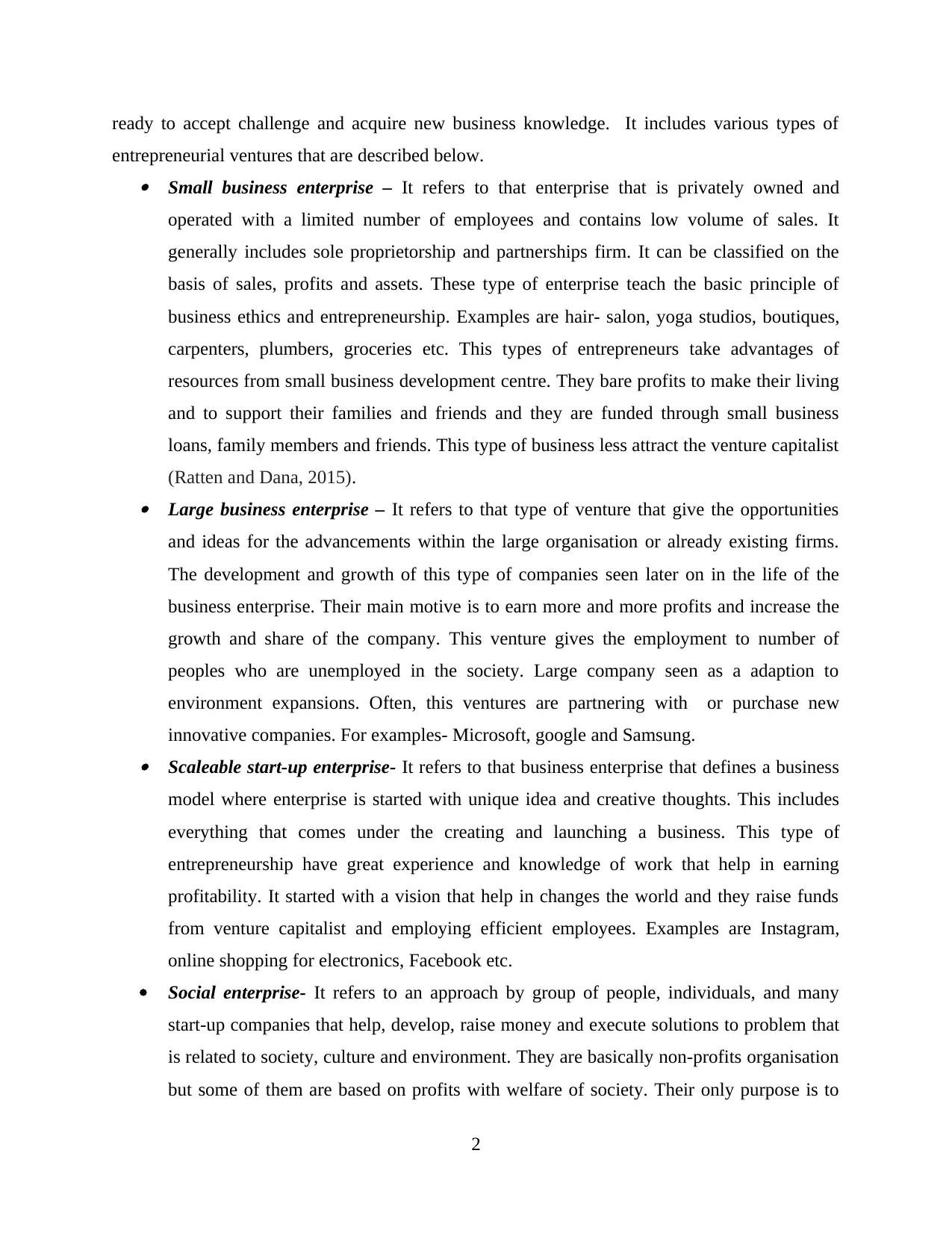
ready to accept challenge and acquire new business knowledge. It includes various types of
entrepreneurial ventures that are described below. Small business enterprise – It refers to that enterprise that is privately owned and
operated with a limited number of employees and contains low volume of sales. It
generally includes sole proprietorship and partnerships firm. It can be classified on the
basis of sales, profits and assets. These type of enterprise teach the basic principle of
business ethics and entrepreneurship. Examples are hair- salon, yoga studios, boutiques,
carpenters, plumbers, groceries etc. This types of entrepreneurs take advantages of
resources from small business development centre. They bare profits to make their living
and to support their families and friends and they are funded through small business
loans, family members and friends. This type of business less attract the venture capitalist
(Ratten and Dana, 2015). Large business enterprise – It refers to that type of venture that give the opportunities
and ideas for the advancements within the large organisation or already existing firms.
The development and growth of this type of companies seen later on in the life of the
business enterprise. Their main motive is to earn more and more profits and increase the
growth and share of the company. This venture gives the employment to number of
peoples who are unemployed in the society. Large company seen as a adaption to
environment expansions. Often, this ventures are partnering with or purchase new
innovative companies. For examples- Microsoft, google and Samsung. Scaleable start-up enterprise- It refers to that business enterprise that defines a business
model where enterprise is started with unique idea and creative thoughts. This includes
everything that comes under the creating and launching a business. This type of
entrepreneurship have great experience and knowledge of work that help in earning
profitability. It started with a vision that help in changes the world and they raise funds
from venture capitalist and employing efficient employees. Examples are Instagram,
online shopping for electronics, Facebook etc.
Social enterprise- It refers to an approach by group of people, individuals, and many
start-up companies that help, develop, raise money and execute solutions to problem that
is related to society, culture and environment. They are basically non-profits organisation
but some of them are based on profits with welfare of society. Their only purpose is to
2
entrepreneurial ventures that are described below. Small business enterprise – It refers to that enterprise that is privately owned and
operated with a limited number of employees and contains low volume of sales. It
generally includes sole proprietorship and partnerships firm. It can be classified on the
basis of sales, profits and assets. These type of enterprise teach the basic principle of
business ethics and entrepreneurship. Examples are hair- salon, yoga studios, boutiques,
carpenters, plumbers, groceries etc. This types of entrepreneurs take advantages of
resources from small business development centre. They bare profits to make their living
and to support their families and friends and they are funded through small business
loans, family members and friends. This type of business less attract the venture capitalist
(Ratten and Dana, 2015). Large business enterprise – It refers to that type of venture that give the opportunities
and ideas for the advancements within the large organisation or already existing firms.
The development and growth of this type of companies seen later on in the life of the
business enterprise. Their main motive is to earn more and more profits and increase the
growth and share of the company. This venture gives the employment to number of
peoples who are unemployed in the society. Large company seen as a adaption to
environment expansions. Often, this ventures are partnering with or purchase new
innovative companies. For examples- Microsoft, google and Samsung. Scaleable start-up enterprise- It refers to that business enterprise that defines a business
model where enterprise is started with unique idea and creative thoughts. This includes
everything that comes under the creating and launching a business. This type of
entrepreneurship have great experience and knowledge of work that help in earning
profitability. It started with a vision that help in changes the world and they raise funds
from venture capitalist and employing efficient employees. Examples are Instagram,
online shopping for electronics, Facebook etc.
Social enterprise- It refers to an approach by group of people, individuals, and many
start-up companies that help, develop, raise money and execute solutions to problem that
is related to society, culture and environment. They are basically non-profits organisation
but some of them are based on profits with welfare of society. Their only purpose is to
2
Paraphrase This Document
Need a fresh take? Get an instant paraphrase of this document with our AI Paraphraser
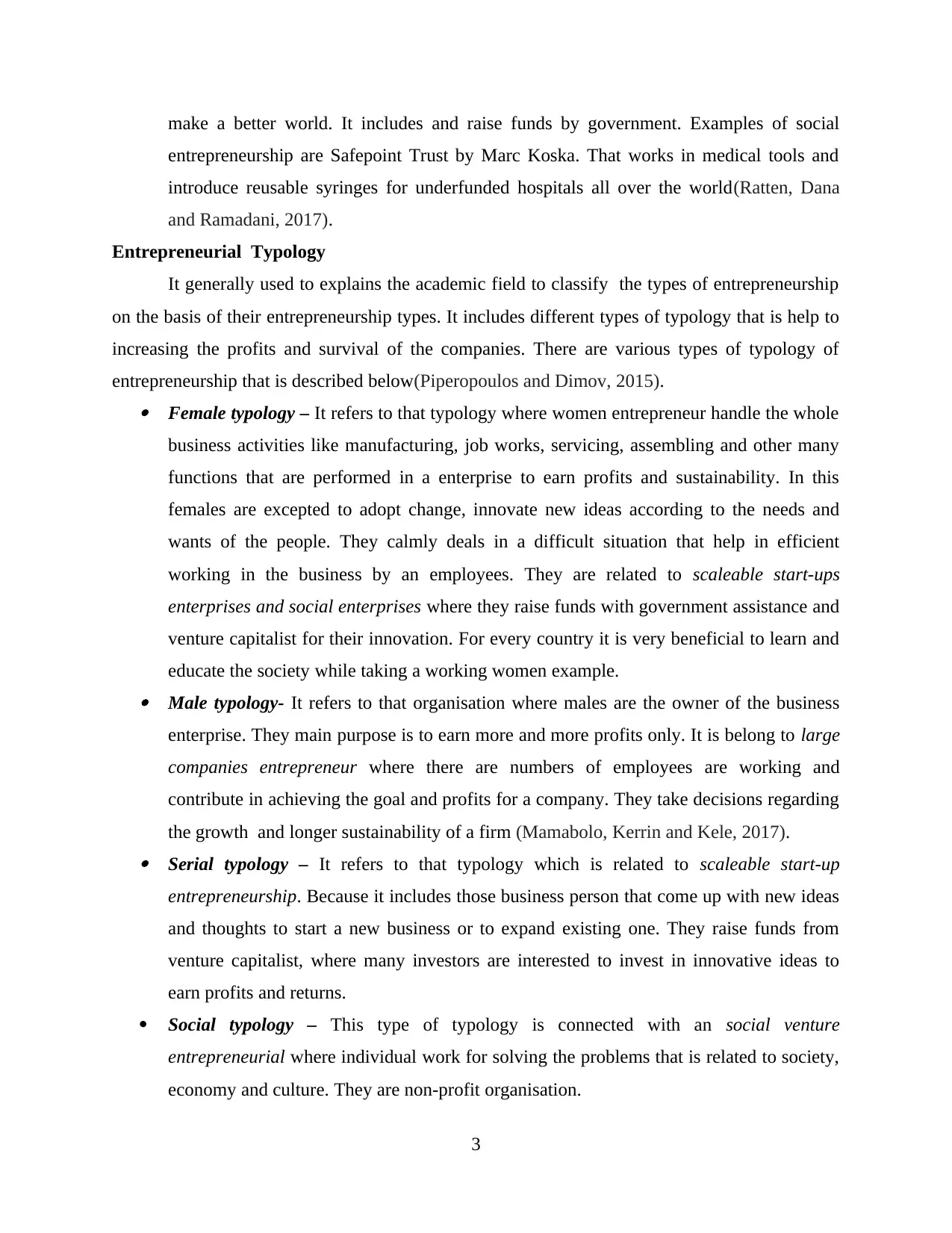
make a better world. It includes and raise funds by government. Examples of social
entrepreneurship are Safepoint Trust by Marc Koska. That works in medical tools and
introduce reusable syringes for underfunded hospitals all over the world(Ratten, Dana
and Ramadani, 2017).
Entrepreneurial Typology
It generally used to explains the academic field to classify the types of entrepreneurship
on the basis of their entrepreneurship types. It includes different types of typology that is help to
increasing the profits and survival of the companies. There are various types of typology of
entrepreneurship that is described below(Piperopoulos and Dimov, 2015). Female typology – It refers to that typology where women entrepreneur handle the whole
business activities like manufacturing, job works, servicing, assembling and other many
functions that are performed in a enterprise to earn profits and sustainability. In this
females are excepted to adopt change, innovate new ideas according to the needs and
wants of the people. They calmly deals in a difficult situation that help in efficient
working in the business by an employees. They are related to scaleable start-ups
enterprises and social enterprises where they raise funds with government assistance and
venture capitalist for their innovation. For every country it is very beneficial to learn and
educate the society while taking a working women example. Male typology- It refers to that organisation where males are the owner of the business
enterprise. They main purpose is to earn more and more profits only. It is belong to large
companies entrepreneur where there are numbers of employees are working and
contribute in achieving the goal and profits for a company. They take decisions regarding
the growth and longer sustainability of a firm (Mamabolo, Kerrin and Kele, 2017). Serial typology – It refers to that typology which is related to scaleable start-up
entrepreneurship. Because it includes those business person that come up with new ideas
and thoughts to start a new business or to expand existing one. They raise funds from
venture capitalist, where many investors are interested to invest in innovative ideas to
earn profits and returns.
Social typology – This type of typology is connected with an social venture
entrepreneurial where individual work for solving the problems that is related to society,
economy and culture. They are non-profit organisation.
3
entrepreneurship are Safepoint Trust by Marc Koska. That works in medical tools and
introduce reusable syringes for underfunded hospitals all over the world(Ratten, Dana
and Ramadani, 2017).
Entrepreneurial Typology
It generally used to explains the academic field to classify the types of entrepreneurship
on the basis of their entrepreneurship types. It includes different types of typology that is help to
increasing the profits and survival of the companies. There are various types of typology of
entrepreneurship that is described below(Piperopoulos and Dimov, 2015). Female typology – It refers to that typology where women entrepreneur handle the whole
business activities like manufacturing, job works, servicing, assembling and other many
functions that are performed in a enterprise to earn profits and sustainability. In this
females are excepted to adopt change, innovate new ideas according to the needs and
wants of the people. They calmly deals in a difficult situation that help in efficient
working in the business by an employees. They are related to scaleable start-ups
enterprises and social enterprises where they raise funds with government assistance and
venture capitalist for their innovation. For every country it is very beneficial to learn and
educate the society while taking a working women example. Male typology- It refers to that organisation where males are the owner of the business
enterprise. They main purpose is to earn more and more profits only. It is belong to large
companies entrepreneur where there are numbers of employees are working and
contribute in achieving the goal and profits for a company. They take decisions regarding
the growth and longer sustainability of a firm (Mamabolo, Kerrin and Kele, 2017). Serial typology – It refers to that typology which is related to scaleable start-up
entrepreneurship. Because it includes those business person that come up with new ideas
and thoughts to start a new business or to expand existing one. They raise funds from
venture capitalist, where many investors are interested to invest in innovative ideas to
earn profits and returns.
Social typology – This type of typology is connected with an social venture
entrepreneurial where individual work for solving the problems that is related to society,
economy and culture. They are non-profit organisation.
3
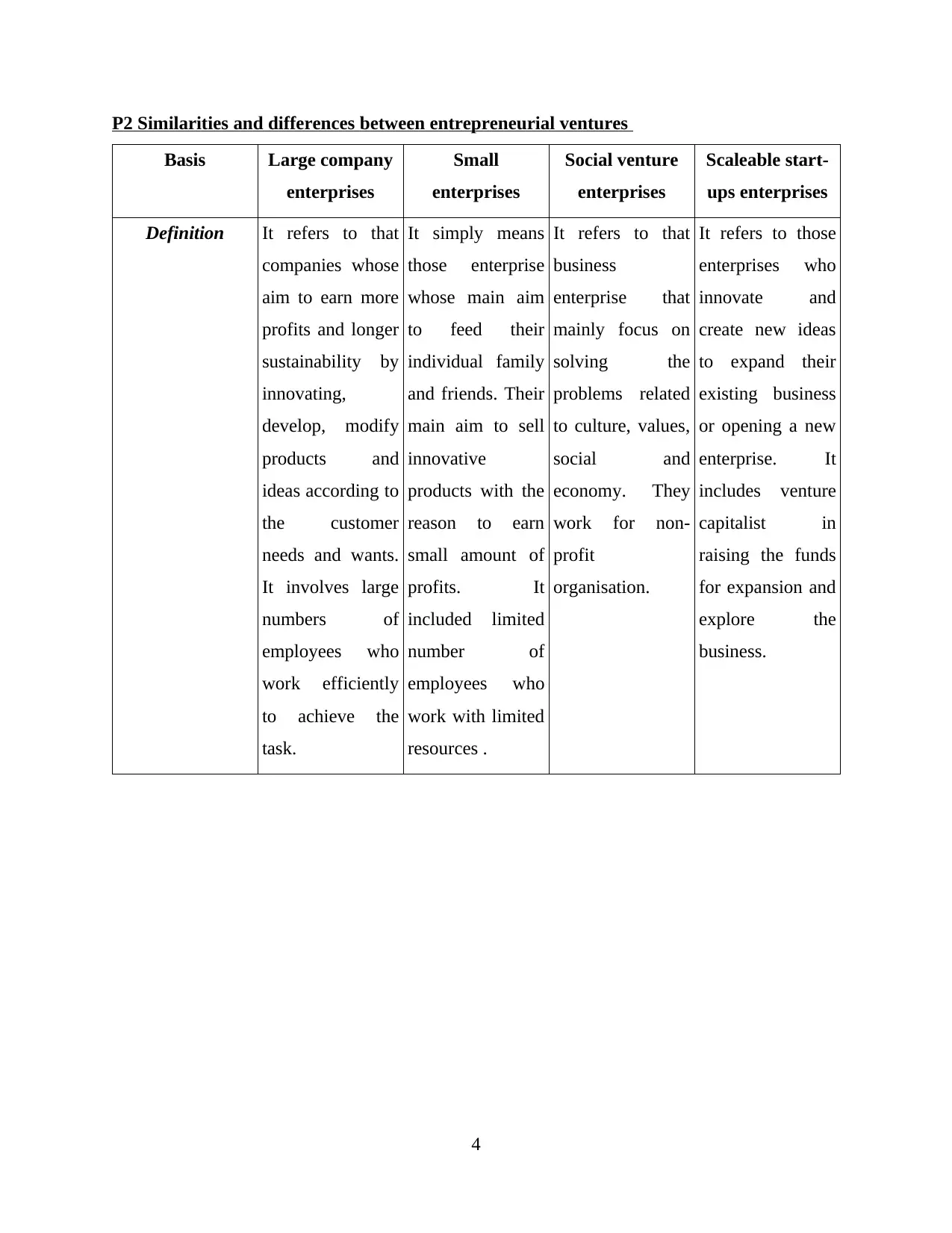
P2 Similarities and differences between entrepreneurial ventures
Basis Large company
enterprises
Small
enterprises
Social venture
enterprises
Scaleable start-
ups enterprises
Definition It refers to that
companies whose
aim to earn more
profits and longer
sustainability by
innovating,
develop, modify
products and
ideas according to
the customer
needs and wants.
It involves large
numbers of
employees who
work efficiently
to achieve the
task.
It simply means
those enterprise
whose main aim
to feed their
individual family
and friends. Their
main aim to sell
innovative
products with the
reason to earn
small amount of
profits. It
included limited
number of
employees who
work with limited
resources .
It refers to that
business
enterprise that
mainly focus on
solving the
problems related
to culture, values,
social and
economy. They
work for non-
profit
organisation.
It refers to those
enterprises who
innovate and
create new ideas
to expand their
existing business
or opening a new
enterprise. It
includes venture
capitalist in
raising the funds
for expansion and
explore the
business.
4
Basis Large company
enterprises
Small
enterprises
Social venture
enterprises
Scaleable start-
ups enterprises
Definition It refers to that
companies whose
aim to earn more
profits and longer
sustainability by
innovating,
develop, modify
products and
ideas according to
the customer
needs and wants.
It involves large
numbers of
employees who
work efficiently
to achieve the
task.
It simply means
those enterprise
whose main aim
to feed their
individual family
and friends. Their
main aim to sell
innovative
products with the
reason to earn
small amount of
profits. It
included limited
number of
employees who
work with limited
resources .
It refers to that
business
enterprise that
mainly focus on
solving the
problems related
to culture, values,
social and
economy. They
work for non-
profit
organisation.
It refers to those
enterprises who
innovate and
create new ideas
to expand their
existing business
or opening a new
enterprise. It
includes venture
capitalist in
raising the funds
for expansion and
explore the
business.
4
⊘ This is a preview!⊘
Do you want full access?
Subscribe today to unlock all pages.

Trusted by 1+ million students worldwide
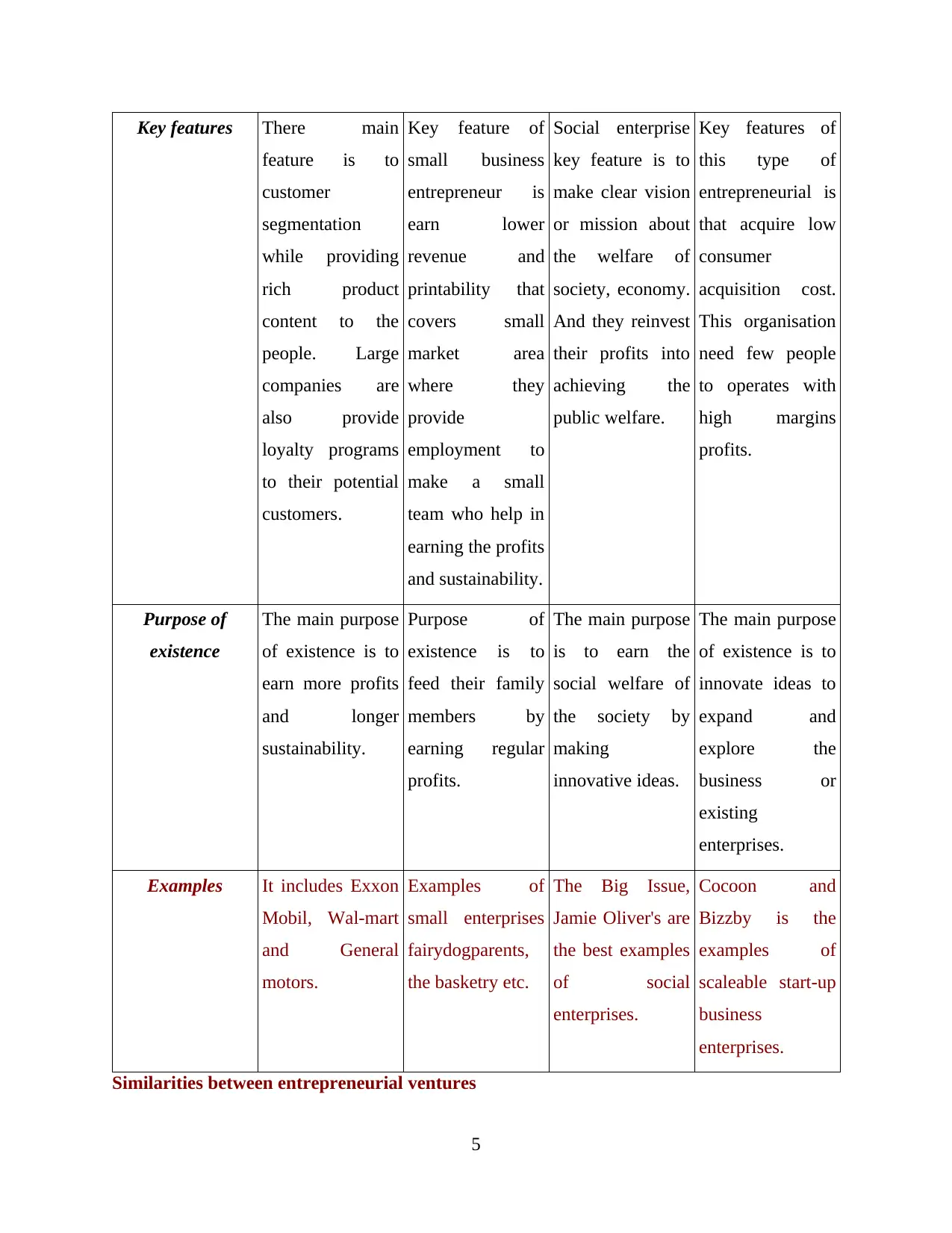
Key features There main
feature is to
customer
segmentation
while providing
rich product
content to the
people. Large
companies are
also provide
loyalty programs
to their potential
customers.
Key feature of
small business
entrepreneur is
earn lower
revenue and
printability that
covers small
market area
where they
provide
employment to
make a small
team who help in
earning the profits
and sustainability.
Social enterprise
key feature is to
make clear vision
or mission about
the welfare of
society, economy.
And they reinvest
their profits into
achieving the
public welfare.
Key features of
this type of
entrepreneurial is
that acquire low
consumer
acquisition cost.
This organisation
need few people
to operates with
high margins
profits.
Purpose of
existence
The main purpose
of existence is to
earn more profits
and longer
sustainability.
Purpose of
existence is to
feed their family
members by
earning regular
profits.
The main purpose
is to earn the
social welfare of
the society by
making
innovative ideas.
The main purpose
of existence is to
innovate ideas to
expand and
explore the
business or
existing
enterprises.
Examples It includes Exxon
Mobil, Wal-mart
and General
motors.
Examples of
small enterprises
fairydogparents,
the basketry etc.
The Big Issue,
Jamie Oliver's are
the best examples
of social
enterprises.
Cocoon and
Bizzby is the
examples of
scaleable start-up
business
enterprises.
Similarities between entrepreneurial ventures
5
feature is to
customer
segmentation
while providing
rich product
content to the
people. Large
companies are
also provide
loyalty programs
to their potential
customers.
Key feature of
small business
entrepreneur is
earn lower
revenue and
printability that
covers small
market area
where they
provide
employment to
make a small
team who help in
earning the profits
and sustainability.
Social enterprise
key feature is to
make clear vision
or mission about
the welfare of
society, economy.
And they reinvest
their profits into
achieving the
public welfare.
Key features of
this type of
entrepreneurial is
that acquire low
consumer
acquisition cost.
This organisation
need few people
to operates with
high margins
profits.
Purpose of
existence
The main purpose
of existence is to
earn more profits
and longer
sustainability.
Purpose of
existence is to
feed their family
members by
earning regular
profits.
The main purpose
is to earn the
social welfare of
the society by
making
innovative ideas.
The main purpose
of existence is to
innovate ideas to
expand and
explore the
business or
existing
enterprises.
Examples It includes Exxon
Mobil, Wal-mart
and General
motors.
Examples of
small enterprises
fairydogparents,
the basketry etc.
The Big Issue,
Jamie Oliver's are
the best examples
of social
enterprises.
Cocoon and
Bizzby is the
examples of
scaleable start-up
business
enterprises.
Similarities between entrepreneurial ventures
5
Paraphrase This Document
Need a fresh take? Get an instant paraphrase of this document with our AI Paraphraser
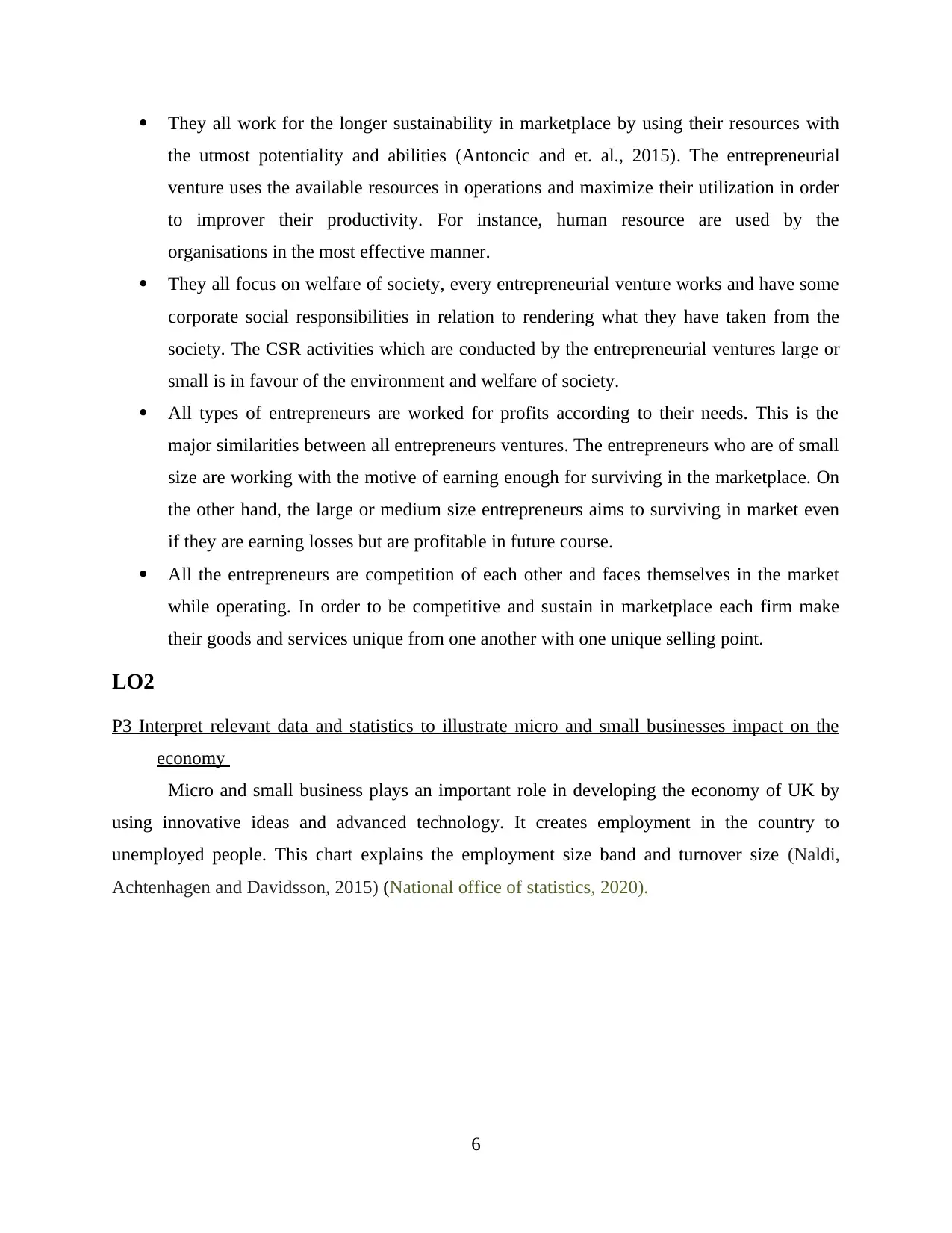
They all work for the longer sustainability in marketplace by using their resources with
the utmost potentiality and abilities (Antoncic and et. al., 2015). The entrepreneurial
venture uses the available resources in operations and maximize their utilization in order
to improver their productivity. For instance, human resource are used by the
organisations in the most effective manner.
They all focus on welfare of society, every entrepreneurial venture works and have some
corporate social responsibilities in relation to rendering what they have taken from the
society. The CSR activities which are conducted by the entrepreneurial ventures large or
small is in favour of the environment and welfare of society.
All types of entrepreneurs are worked for profits according to their needs. This is the
major similarities between all entrepreneurs ventures. The entrepreneurs who are of small
size are working with the motive of earning enough for surviving in the marketplace. On
the other hand, the large or medium size entrepreneurs aims to surviving in market even
if they are earning losses but are profitable in future course.
All the entrepreneurs are competition of each other and faces themselves in the market
while operating. In order to be competitive and sustain in marketplace each firm make
their goods and services unique from one another with one unique selling point.
LO2
P3 Interpret relevant data and statistics to illustrate micro and small businesses impact on the
economy
Micro and small business plays an important role in developing the economy of UK by
using innovative ideas and advanced technology. It creates employment in the country to
unemployed people. This chart explains the employment size band and turnover size (Naldi,
Achtenhagen and Davidsson, 2015) (National office of statistics, 2020).
6
the utmost potentiality and abilities (Antoncic and et. al., 2015). The entrepreneurial
venture uses the available resources in operations and maximize their utilization in order
to improver their productivity. For instance, human resource are used by the
organisations in the most effective manner.
They all focus on welfare of society, every entrepreneurial venture works and have some
corporate social responsibilities in relation to rendering what they have taken from the
society. The CSR activities which are conducted by the entrepreneurial ventures large or
small is in favour of the environment and welfare of society.
All types of entrepreneurs are worked for profits according to their needs. This is the
major similarities between all entrepreneurs ventures. The entrepreneurs who are of small
size are working with the motive of earning enough for surviving in the marketplace. On
the other hand, the large or medium size entrepreneurs aims to surviving in market even
if they are earning losses but are profitable in future course.
All the entrepreneurs are competition of each other and faces themselves in the market
while operating. In order to be competitive and sustain in marketplace each firm make
their goods and services unique from one another with one unique selling point.
LO2
P3 Interpret relevant data and statistics to illustrate micro and small businesses impact on the
economy
Micro and small business plays an important role in developing the economy of UK by
using innovative ideas and advanced technology. It creates employment in the country to
unemployed people. This chart explains the employment size band and turnover size (Naldi,
Achtenhagen and Davidsson, 2015) (National office of statistics, 2020).
6
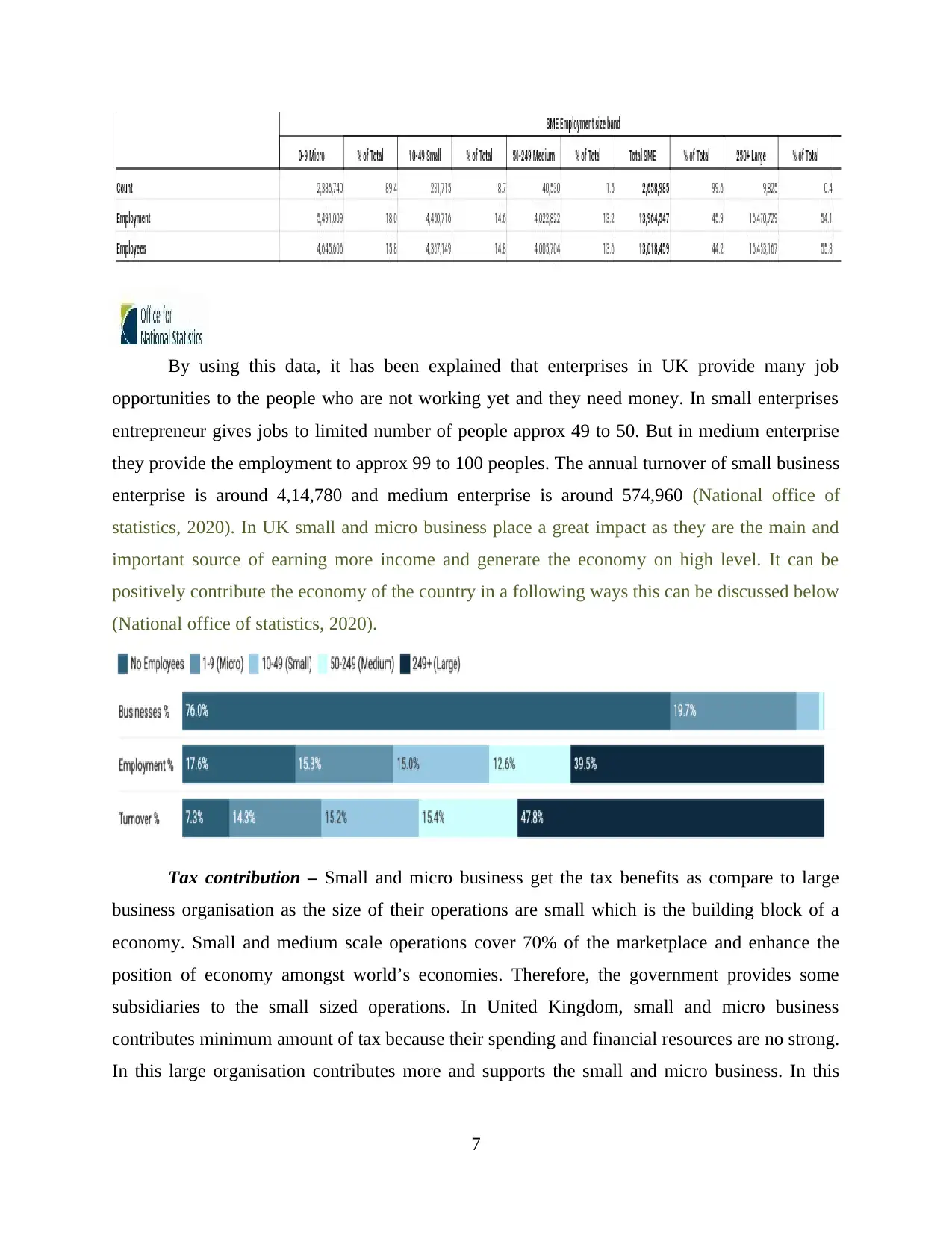
By using this data, it has been explained that enterprises in UK provide many job
opportunities to the people who are not working yet and they need money. In small enterprises
entrepreneur gives jobs to limited number of people approx 49 to 50. But in medium enterprise
they provide the employment to approx 99 to 100 peoples. The annual turnover of small business
enterprise is around 4,14,780 and medium enterprise is around 574,960 (National office of
statistics, 2020). In UK small and micro business place a great impact as they are the main and
important source of earning more income and generate the economy on high level. It can be
positively contribute the economy of the country in a following ways this can be discussed below
(National office of statistics, 2020).
Tax contribution – Small and micro business get the tax benefits as compare to large
business organisation as the size of their operations are small which is the building block of a
economy. Small and medium scale operations cover 70% of the marketplace and enhance the
position of economy amongst world’s economies. Therefore, the government provides some
subsidiaries to the small sized operations. In United Kingdom, small and micro business
contributes minimum amount of tax because their spending and financial resources are no strong.
In this large organisation contributes more and supports the small and micro business. In this
7
opportunities to the people who are not working yet and they need money. In small enterprises
entrepreneur gives jobs to limited number of people approx 49 to 50. But in medium enterprise
they provide the employment to approx 99 to 100 peoples. The annual turnover of small business
enterprise is around 4,14,780 and medium enterprise is around 574,960 (National office of
statistics, 2020). In UK small and micro business place a great impact as they are the main and
important source of earning more income and generate the economy on high level. It can be
positively contribute the economy of the country in a following ways this can be discussed below
(National office of statistics, 2020).
Tax contribution – Small and micro business get the tax benefits as compare to large
business organisation as the size of their operations are small which is the building block of a
economy. Small and medium scale operations cover 70% of the marketplace and enhance the
position of economy amongst world’s economies. Therefore, the government provides some
subsidiaries to the small sized operations. In United Kingdom, small and micro business
contributes minimum amount of tax because their spending and financial resources are no strong.
In this large organisation contributes more and supports the small and micro business. In this
7
⊘ This is a preview!⊘
Do you want full access?
Subscribe today to unlock all pages.

Trusted by 1+ million students worldwide
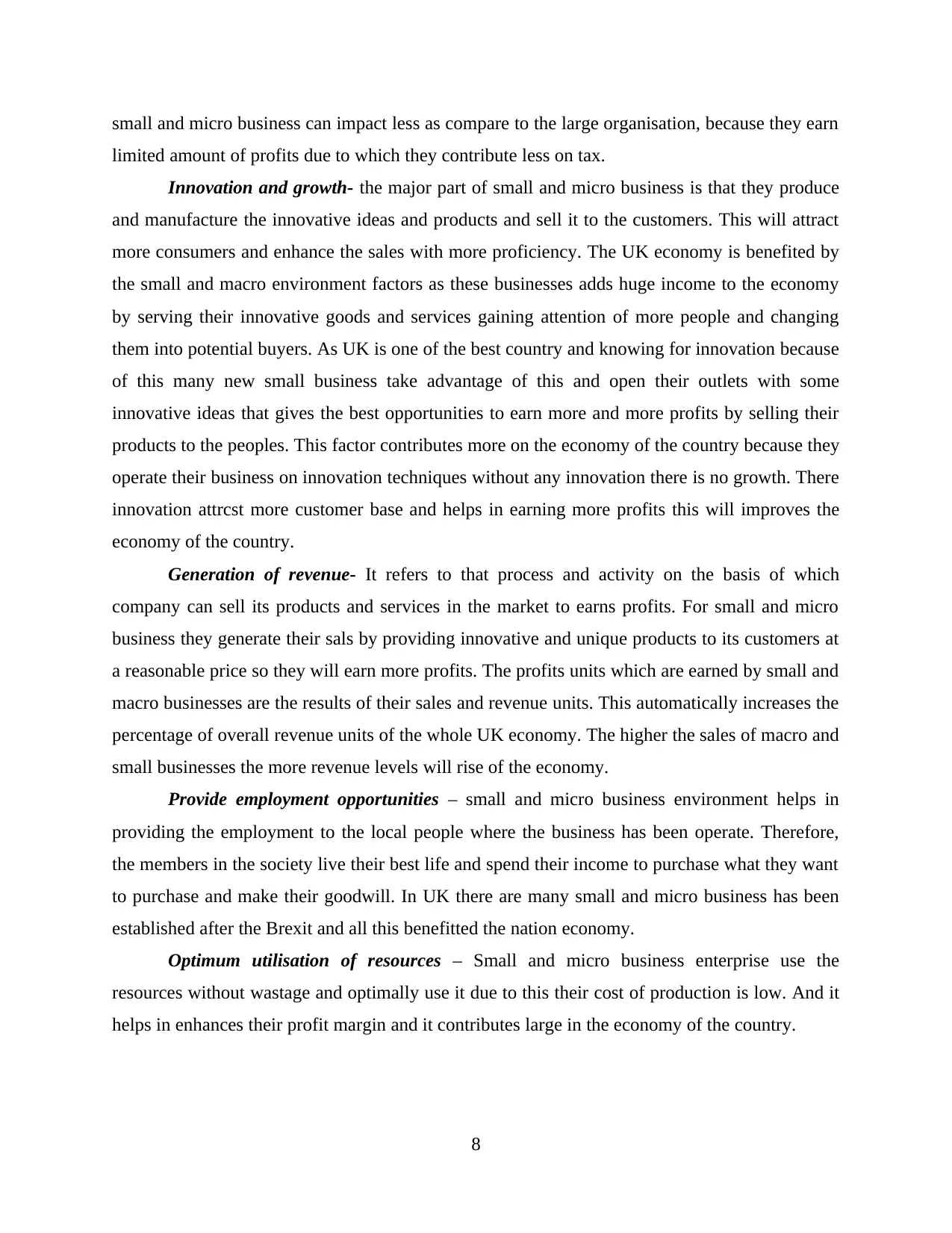
small and micro business can impact less as compare to the large organisation, because they earn
limited amount of profits due to which they contribute less on tax.
Innovation and growth- the major part of small and micro business is that they produce
and manufacture the innovative ideas and products and sell it to the customers. This will attract
more consumers and enhance the sales with more proficiency. The UK economy is benefited by
the small and macro environment factors as these businesses adds huge income to the economy
by serving their innovative goods and services gaining attention of more people and changing
them into potential buyers. As UK is one of the best country and knowing for innovation because
of this many new small business take advantage of this and open their outlets with some
innovative ideas that gives the best opportunities to earn more and more profits by selling their
products to the peoples. This factor contributes more on the economy of the country because they
operate their business on innovation techniques without any innovation there is no growth. There
innovation attrcst more customer base and helps in earning more profits this will improves the
economy of the country.
Generation of revenue- It refers to that process and activity on the basis of which
company can sell its products and services in the market to earns profits. For small and micro
business they generate their sals by providing innovative and unique products to its customers at
a reasonable price so they will earn more profits. The profits units which are earned by small and
macro businesses are the results of their sales and revenue units. This automatically increases the
percentage of overall revenue units of the whole UK economy. The higher the sales of macro and
small businesses the more revenue levels will rise of the economy.
Provide employment opportunities – small and micro business environment helps in
providing the employment to the local people where the business has been operate. Therefore,
the members in the society live their best life and spend their income to purchase what they want
to purchase and make their goodwill. In UK there are many small and micro business has been
established after the Brexit and all this benefitted the nation economy.
Optimum utilisation of resources – Small and micro business enterprise use the
resources without wastage and optimally use it due to this their cost of production is low. And it
helps in enhances their profit margin and it contributes large in the economy of the country.
8
limited amount of profits due to which they contribute less on tax.
Innovation and growth- the major part of small and micro business is that they produce
and manufacture the innovative ideas and products and sell it to the customers. This will attract
more consumers and enhance the sales with more proficiency. The UK economy is benefited by
the small and macro environment factors as these businesses adds huge income to the economy
by serving their innovative goods and services gaining attention of more people and changing
them into potential buyers. As UK is one of the best country and knowing for innovation because
of this many new small business take advantage of this and open their outlets with some
innovative ideas that gives the best opportunities to earn more and more profits by selling their
products to the peoples. This factor contributes more on the economy of the country because they
operate their business on innovation techniques without any innovation there is no growth. There
innovation attrcst more customer base and helps in earning more profits this will improves the
economy of the country.
Generation of revenue- It refers to that process and activity on the basis of which
company can sell its products and services in the market to earns profits. For small and micro
business they generate their sals by providing innovative and unique products to its customers at
a reasonable price so they will earn more profits. The profits units which are earned by small and
macro businesses are the results of their sales and revenue units. This automatically increases the
percentage of overall revenue units of the whole UK economy. The higher the sales of macro and
small businesses the more revenue levels will rise of the economy.
Provide employment opportunities – small and micro business environment helps in
providing the employment to the local people where the business has been operate. Therefore,
the members in the society live their best life and spend their income to purchase what they want
to purchase and make their goodwill. In UK there are many small and micro business has been
established after the Brexit and all this benefitted the nation economy.
Optimum utilisation of resources – Small and micro business enterprise use the
resources without wastage and optimally use it due to this their cost of production is low. And it
helps in enhances their profit margin and it contributes large in the economy of the country.
8
Paraphrase This Document
Need a fresh take? Get an instant paraphrase of this document with our AI Paraphraser
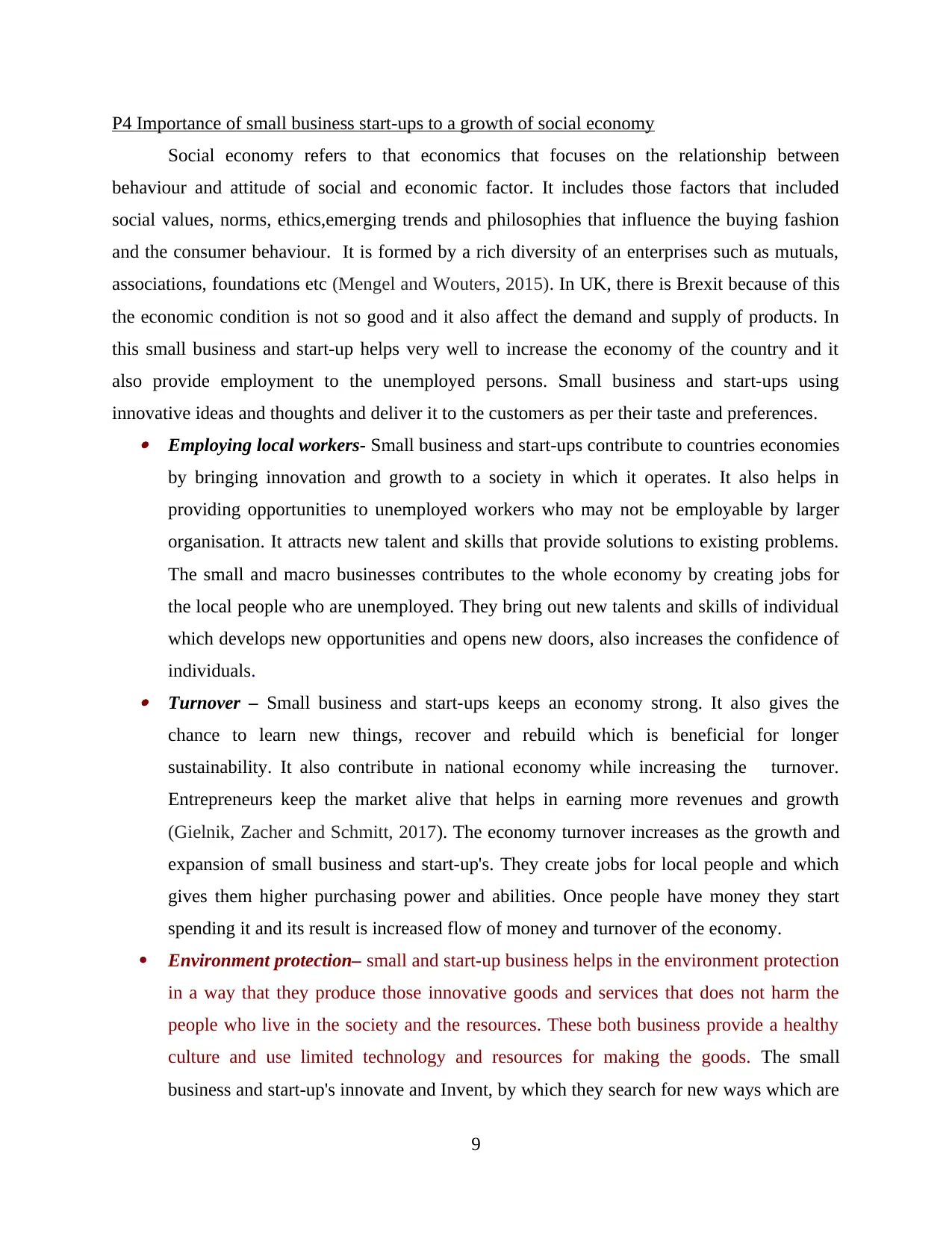
P4 Importance of small business start-ups to a growth of social economy
Social economy refers to that economics that focuses on the relationship between
behaviour and attitude of social and economic factor. It includes those factors that included
social values, norms, ethics,emerging trends and philosophies that influence the buying fashion
and the consumer behaviour. It is formed by a rich diversity of an enterprises such as mutuals,
associations, foundations etc (Mengel and Wouters, 2015). In UK, there is Brexit because of this
the economic condition is not so good and it also affect the demand and supply of products. In
this small business and start-up helps very well to increase the economy of the country and it
also provide employment to the unemployed persons. Small business and start-ups using
innovative ideas and thoughts and deliver it to the customers as per their taste and preferences. Employing local workers- Small business and start-ups contribute to countries economies
by bringing innovation and growth to a society in which it operates. It also helps in
providing opportunities to unemployed workers who may not be employable by larger
organisation. It attracts new talent and skills that provide solutions to existing problems.
The small and macro businesses contributes to the whole economy by creating jobs for
the local people who are unemployed. They bring out new talents and skills of individual
which develops new opportunities and opens new doors, also increases the confidence of
individuals. Turnover – Small business and start-ups keeps an economy strong. It also gives the
chance to learn new things, recover and rebuild which is beneficial for longer
sustainability. It also contribute in national economy while increasing the turnover.
Entrepreneurs keep the market alive that helps in earning more revenues and growth
(Gielnik, Zacher and Schmitt, 2017). The economy turnover increases as the growth and
expansion of small business and start-up's. They create jobs for local people and which
gives them higher purchasing power and abilities. Once people have money they start
spending it and its result is increased flow of money and turnover of the economy.
Environment protection– small and start-up business helps in the environment protection
in a way that they produce those innovative goods and services that does not harm the
people who live in the society and the resources. These both business provide a healthy
culture and use limited technology and resources for making the goods. The small
business and start-up's innovate and Invent, by which they search for new ways which are
9
Social economy refers to that economics that focuses on the relationship between
behaviour and attitude of social and economic factor. It includes those factors that included
social values, norms, ethics,emerging trends and philosophies that influence the buying fashion
and the consumer behaviour. It is formed by a rich diversity of an enterprises such as mutuals,
associations, foundations etc (Mengel and Wouters, 2015). In UK, there is Brexit because of this
the economic condition is not so good and it also affect the demand and supply of products. In
this small business and start-up helps very well to increase the economy of the country and it
also provide employment to the unemployed persons. Small business and start-ups using
innovative ideas and thoughts and deliver it to the customers as per their taste and preferences. Employing local workers- Small business and start-ups contribute to countries economies
by bringing innovation and growth to a society in which it operates. It also helps in
providing opportunities to unemployed workers who may not be employable by larger
organisation. It attracts new talent and skills that provide solutions to existing problems.
The small and macro businesses contributes to the whole economy by creating jobs for
the local people who are unemployed. They bring out new talents and skills of individual
which develops new opportunities and opens new doors, also increases the confidence of
individuals. Turnover – Small business and start-ups keeps an economy strong. It also gives the
chance to learn new things, recover and rebuild which is beneficial for longer
sustainability. It also contribute in national economy while increasing the turnover.
Entrepreneurs keep the market alive that helps in earning more revenues and growth
(Gielnik, Zacher and Schmitt, 2017). The economy turnover increases as the growth and
expansion of small business and start-up's. They create jobs for local people and which
gives them higher purchasing power and abilities. Once people have money they start
spending it and its result is increased flow of money and turnover of the economy.
Environment protection– small and start-up business helps in the environment protection
in a way that they produce those innovative goods and services that does not harm the
people who live in the society and the resources. These both business provide a healthy
culture and use limited technology and resources for making the goods. The small
business and start-up's innovate and Invent, by which they search for new ways which are
9
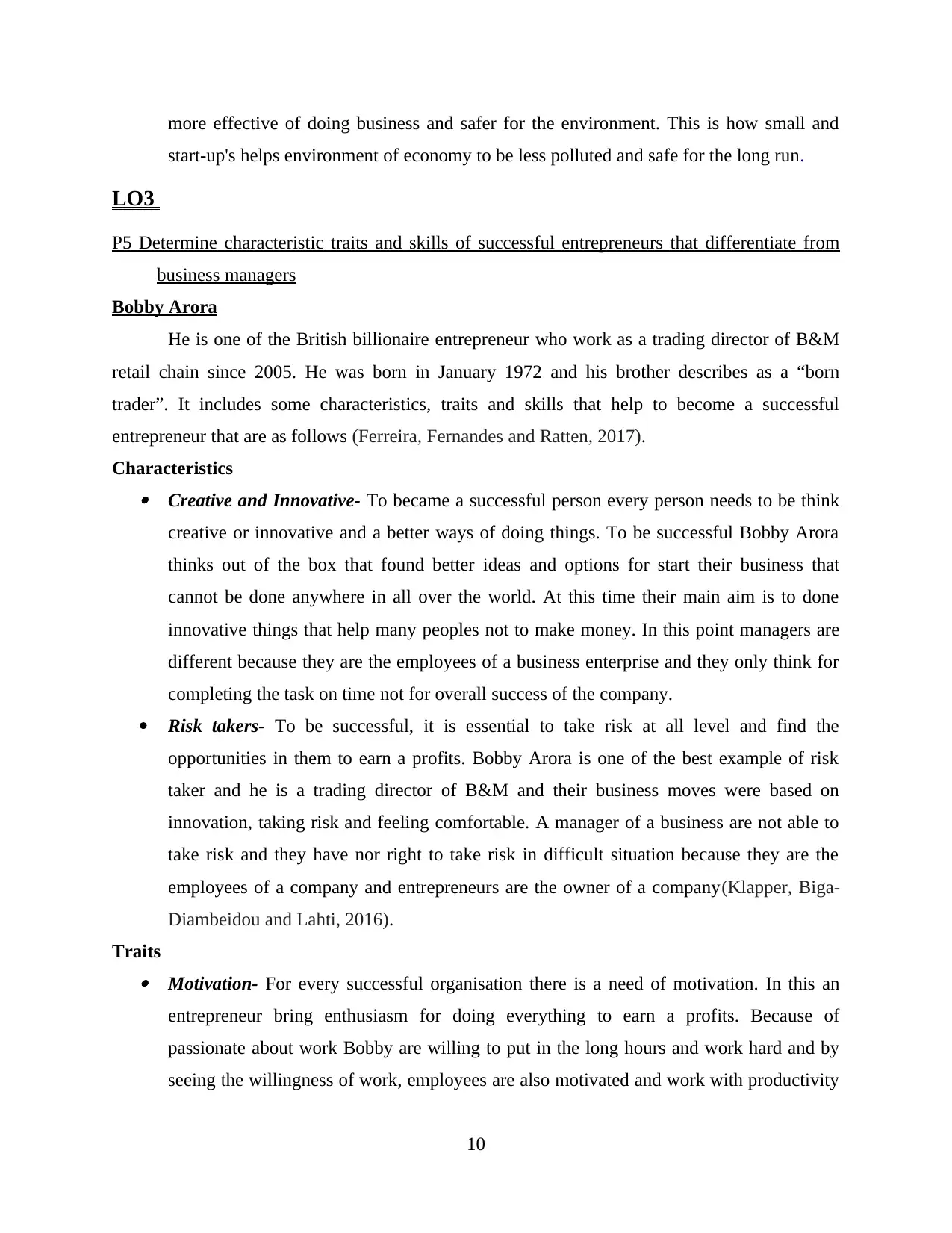
more effective of doing business and safer for the environment. This is how small and
start-up's helps environment of economy to be less polluted and safe for the long run.
LO3
P5 Determine characteristic traits and skills of successful entrepreneurs that differentiate from
business managers
Bobby Arora
He is one of the British billionaire entrepreneur who work as a trading director of B&M
retail chain since 2005. He was born in January 1972 and his brother describes as a “born
trader”. It includes some characteristics, traits and skills that help to become a successful
entrepreneur that are as follows (Ferreira, Fernandes and Ratten, 2017).
Characteristics Creative and Innovative- To became a successful person every person needs to be think
creative or innovative and a better ways of doing things. To be successful Bobby Arora
thinks out of the box that found better ideas and options for start their business that
cannot be done anywhere in all over the world. At this time their main aim is to done
innovative things that help many peoples not to make money. In this point managers are
different because they are the employees of a business enterprise and they only think for
completing the task on time not for overall success of the company.
Risk takers- To be successful, it is essential to take risk at all level and find the
opportunities in them to earn a profits. Bobby Arora is one of the best example of risk
taker and he is a trading director of B&M and their business moves were based on
innovation, taking risk and feeling comfortable. A manager of a business are not able to
take risk and they have nor right to take risk in difficult situation because they are the
employees of a company and entrepreneurs are the owner of a company(Klapper, Biga-
Diambeidou and Lahti, 2016).
Traits Motivation- For every successful organisation there is a need of motivation. In this an
entrepreneur bring enthusiasm for doing everything to earn a profits. Because of
passionate about work Bobby are willing to put in the long hours and work hard and by
seeing the willingness of work, employees are also motivated and work with productivity
10
start-up's helps environment of economy to be less polluted and safe for the long run.
LO3
P5 Determine characteristic traits and skills of successful entrepreneurs that differentiate from
business managers
Bobby Arora
He is one of the British billionaire entrepreneur who work as a trading director of B&M
retail chain since 2005. He was born in January 1972 and his brother describes as a “born
trader”. It includes some characteristics, traits and skills that help to become a successful
entrepreneur that are as follows (Ferreira, Fernandes and Ratten, 2017).
Characteristics Creative and Innovative- To became a successful person every person needs to be think
creative or innovative and a better ways of doing things. To be successful Bobby Arora
thinks out of the box that found better ideas and options for start their business that
cannot be done anywhere in all over the world. At this time their main aim is to done
innovative things that help many peoples not to make money. In this point managers are
different because they are the employees of a business enterprise and they only think for
completing the task on time not for overall success of the company.
Risk takers- To be successful, it is essential to take risk at all level and find the
opportunities in them to earn a profits. Bobby Arora is one of the best example of risk
taker and he is a trading director of B&M and their business moves were based on
innovation, taking risk and feeling comfortable. A manager of a business are not able to
take risk and they have nor right to take risk in difficult situation because they are the
employees of a company and entrepreneurs are the owner of a company(Klapper, Biga-
Diambeidou and Lahti, 2016).
Traits Motivation- For every successful organisation there is a need of motivation. In this an
entrepreneur bring enthusiasm for doing everything to earn a profits. Because of
passionate about work Bobby are willing to put in the long hours and work hard and by
seeing the willingness of work, employees are also motivated and work with productivity
10
⊘ This is a preview!⊘
Do you want full access?
Subscribe today to unlock all pages.

Trusted by 1+ million students worldwide
1 out of 18
Related Documents
Your All-in-One AI-Powered Toolkit for Academic Success.
+13062052269
info@desklib.com
Available 24*7 on WhatsApp / Email
![[object Object]](/_next/static/media/star-bottom.7253800d.svg)
Unlock your academic potential
Copyright © 2020–2026 A2Z Services. All Rights Reserved. Developed and managed by ZUCOL.





